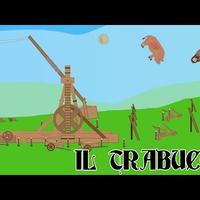La STORIA delle ARMI D'ASSEDIO MEDIEVALI: il TRABUCCO
||||of siege|||trebuchet
DIE GESCHICHTE DER MITTELALTERLICHEN ANGRIFFSWAFFEN: DER TRABUCCO
The HISTORY of MEDIEVAL WEAPONS OF ASSASSEDY: the TRABUCCO
HISTORIA DE LAS ARMAS DE ASEDIO MEDIEVALES: EL TRABUCCO
L'HISTOIRE DES ARMES D'ASSEDUCTION MÉDIÉVALES : LE TRABUCCO
中世暗殺武器の歴史:トラブッコ
DE GESCHIEDENIS VAN MIDDELEEUWSE WAPENS: DE TRABUCCO
HISTORIA ŚREDNIOWIECZNEJ BRONI OBUCHOWEJ: TRABUCCO
HISTÓRIA DAS ARMAS DE ASSEDUÇÃO MEDIEVAIS: O TRABUCCO
Il Trabucco Arma d'assedio medievale
|||Belagerungswaffe|mittelalterliche
The Trabucco Medieval siege weapon
Il trabucco era una grande arma d'assedio vista per la prima volta in Cina, durante
|Trabuchet|||||||||||||
The trebuchet was a large siege weapon first seen in China during
il IV secolo AC, raggiungendo l'Europa durante il periodo medievale.
|IV||BC|reaching|||||
the 4th century BC, reaching Europe during the medieval period.
Era una sorta di catapulta o frombola di grande dimensioni, e lanciava pesanti pietre contro
||eine Art von||Katapult||Steinschleuder||||||||
||sort||||sling|||||she launched|||
It was a kind of large catapult or sling, and threw heavy stones at
castelli o muri nemici.
castles||walls|
enemy castles or walls.
Le pietre pesanti non erano le uniche munizioni utilizzate:
||||||unique||used
Heavy stones weren't the only ammunition used:
- letame - cadaveri umani
Mist||
mire|bodies|
- manure - human corpses
- e animali morti venivano a loro volta gettati nelle postazioni
|||||||||Stellungen
||dead|||||you were thrown||
- and dead animals were in turn thrown into the posts
nemiche per diffondere le epidemie.
||verbreiten||
||to spread||epidemics
enemies to spread epidemics.
Il trabucco di trazione, azionato con la forza manuale delle persone, si evolse nel trabucco
|Triebwerk||Zugkraft|betrieben||||||||entwickelte sich||
|||traction|activated||||manual||||it evolved||
The traction trebuchet, operated with the manual force of people, evolved into the trebuchet
a contrappeso, che funzionava sfruttando un contrappeso sul braccio corto.
|Gegengewicht||||||||
|counterweight|||||||arm|short
counterweight, which worked using a counterweight on the short arm.
Una lunga trave di legno veniva messa in posizione decentrata, con dei pesanti contrappesi sul
||Balken||||||||||||
||beam||||placed|||decentered||||counterweights|
A long wooden beam was placed in an off-center position, with heavy counterweights on the
braccio corto e mentre la parte più lunga della trave reggeva il proiettile in una fionda.
|||||||||Balken||||||Schleuder
||||||||||it held|||||sling
short arm and while the longer part of the beam held the bullet in a sling.
Nel momento in cui questo braccio veniva rilasciato, il contrappeso cadeva verso il basso, tirando
|||||||released|||||||
The moment this arm was released, the counterweight dropped down, pulling
verso l'alto l'estremità più lunga, e lanciando il proiettile in aria.
||||||||||Luft
|up|the extremity||||||||
up the longer end, and throwing the bullet into the air.
L'aggiunta della fionda permetteva di mirare regolando l'angolo, anziché spostare l'intero
die Hinzufügung||Schleuder|||||||verschieben|
the addition||slingshot||||adjusting|||to move|the entire
The addition of the slingshot allowed you to aim by adjusting the angle, rather than moving the whole
trabucco.
trebuchet.
Nel 1304, durante l'assedio del castello di Stirling contro gli scozzesi, Edoardo primo
||the siege||castle||Stirling|||Scots|Edoardo|
In 1304, during the siege of Stirling Castle against the Scots, Edward the First
d'Inghilterra ordinò ai suoi falegnami di costruire un trabucco che sarebbe stato nominato
||||||||||würde genannt||
of England|he ordered|||carpenters||||||||named
of England ordered his carpenters to build a trebuchet that would be named
"il lupo da guerra".
|wolf||
"the war wolf".
Sarebbe stato il trabucco più grande mai realizzato, alto fino a 120 metri, e avrebbe
|||Trabucco||||||||||
It would have been the largest trebuchet ever made, up to 120 meters high, and would have
potuto scagliare pietre pesanti fino a 136 chilogrammi.
|to throw|||||kilograms
Could hurl stones as heavy as 136 kilograms.
Assistendo alla sua costruzione, gli scozzesi nel castello offrirono la loro resa, ma dopo
|||||die Schotten||||||Kapitulierung||
assisting|||||||castle|||their|||
Witnessing its construction, the Scots in the castle offered their surrender, but later
tre mesi di lavoro sul Lupo da guerra, Edward non riuscì a resistere alla tentazione di
||||||||Edward|not|he succeeded||||temptation|
three months of work on the War Wolf, Edward could not resist the temptation to
provare la sua nuova arma.
try his new weapon.
Ordinò alla tregua scozzese/agli scozzesi in tregua di rientrare nel castello e riprese
||Waffenstillstand|||||||||||
||truce|Scottish||||||to re-enter||||
He ordered the Scottish truce / the Scots in truce to re-enter the castle and resumed
l'assedio.
the siege.
Con la prima pietra lanciata, il lupo di guerra distrusse con facilità un intero muro del
||||||||||||||Mauer|
||||thrown|||||he destroyed||ease||entire||
With the first stone thrown, the war wolf easily destroyed an entire wall of the
castello, trasformandolo in macerie.
|||Ruinen
|transforming him||ruins
castle, turning it into rubble.
A questo punto Edward accettò la resa scozzese.
||||he accepted||surrender|
At this point Edward accepted the Scottish surrender.
In seguito l'uso militare del trabucco calò, con l'avvento del cannone e della polvere
||||||fiel|||||||Schießpulver
||the use||||it fell||the advent||cannon|||powder
|||||||||||||proch
Following the military use of the trebuchet fell, with the advent of the cannon and the powder
da sparo.
|Schuss
for|shot
from shot.

